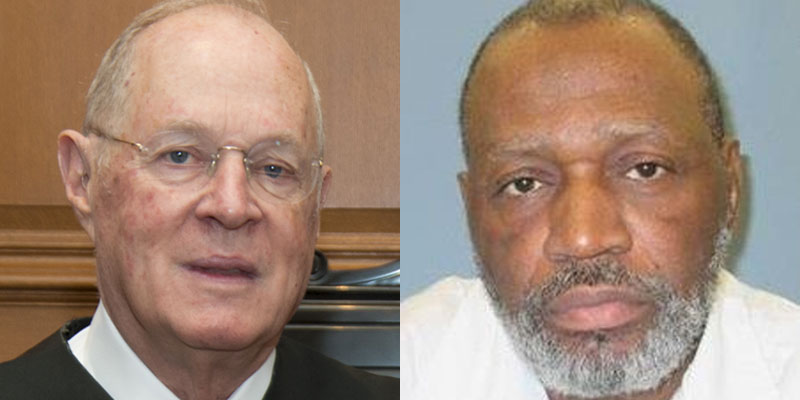Experts this week have debated the impact of Supreme Court Justice Anthony Kennedy’s retirement. For one Alabama death row inmate, however, it literally could mean the difference between life and death.
Kennedy, who announced that he will step down at the end of July, was not an automatic vote for death row inmates over the years. But his vote nearly always was necessary for rulings that narrowed the scope or application of capital punishment.
That could be bad news for Vernon Madison, whose case has been set for the high court term that begins in October. By then, a new justice selected by President Donald Trump is likely to be in Kennedy’s seat, and experts believe the odds are high that the replacement will be a more reliable capital punishment defender.
“Justice Kennedy’s retirement was not good news for death row prisoners in general,” said Robert Dunham, executive director of the Death Penalty Information Center.
Madison is one of Alabama’s longest-serving death row inmates. A Mobile County jury convicted him of murder in the shooting death of Officer Julius Schulte, who was responding to a domestic disturbance call. Madison was on parole at the time.
His case has taken a long and winding road through the courts over the decades. State appellate courts twice overturned convictions. In 1994 — in Madison’s third trial — a jury again found him guilty, and a judge sentenced him to death.
Madison challenged the conviction in federal court, arguing that state prosecutors improperly had excluded blacks from the jury. The Atlanta-based 11th U.S. Circuit Court of Appeals put the execution on hold and instructed U.S. District Judge Kristi DuBose in Mobile to examine the allegation. The judge ruled in 2013 that the prosecutors had legitimate, non-race reasons for striking the potential jurors.
The Supreme Court last year rejected Madison’s appeal, putting him closer to execution. But now his lawyers have raised a novel challenge. They argue that Madison suffers from dementia and cannot remember the crime. Executing him now, the lawyers maintain, would amount to a violation of the Eighth Amendment’s prohibition against cruel and unusual punishment.
Dunham, of the Death Penalty Information Center, said Madison likely would fail if he brought the case as a habeas action — a direct appeal to the federal courts — like the one the court rejected last year.
But the latest challenge comes as an appeal from a state court decision, which carries a different standard for the Supreme Court to consider.
“Madison’s case has unique facts,” Dunham said. “So I don’t think we’ll be able to tell what the impact (of Kennedy’s retirement) is going to be.”
Dunham said Kennedy’s impact on the death penalty has been large, however.
“Historically, the Eighth Amendment meant what Justice Kennedy thought it meant,” he said. “He was the swing vote in so many cases.”
Kennedy wrote the majority opinion, or played a significant role, in several landmark death penalty cases that constrained its use. Among them:
Atkins v. Virginia. Kennedy joined the 6-3 majority in 2002 decision banning the death penalty for mentally retarded defendants.
Roper v. Simmons. Kennedy, joined by the court’s four liberals, wrote the majority opinion in a 2005 case holding that it was unconstitutional to execute people who committed capital offenses before they were 18 years old. It overturned a 16-year-old precedent and struck down laws in 25 states.
Kennedy v. Louisiana. Kennedy led a 5-4 majority in 2008 that that ruled the death penalty unconstitutional for crimes other than murder. Patrick O’Neal Kennedy — no relation to the justice — had been sentenced to death for rape of a child.
Hall v. Florida. Kennedy wrote the majority opinion in a 5-4 case in 2014 in which he again teamed up with the court’s four liberals. The majority declared that the IQ score Florida used to determine whether defendants were too mentally retarded to be executed was too rigid. The court required states to take a less mechanical approach to determining eligibility for capital punishment.
“Florida’s law contravenes our nation’s commitment to dignity and its duty to teach human decency as the mark of a civilized world,” he wrote.
@BrendanKKirby is a senior political reporter at LifeZette and author of “Wicked Mobile.”













